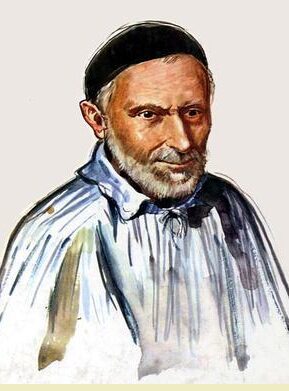“St. Vincent Confronts the Crisis of Values of his era” represents Luigi Mezzadri, CM research on this issue. Some selections from the study…
“Certainly today Vincent would also speak about “a crisis in values”. Value is something that arises as the result of an agreement that leads to a certain understanding.
…
“the situation of the poor during the seventeenth century became worse as a result of the financial crisis that occurred at that time and also as a result of the way in which society viewed those persons who were poor. Instead of viewing the poor as the image of Christ, the poor were seen as dangerous, an annoyance, and as sinners. The poor were poor because they did not work and anyone who did not work was evil. The foundlings were doubly cursed because “they were conceived in sin”. Therefore did not people cooperate with evil when they assisted and provided for the foundlings?
“If the poor during the Medieval Era were the image of Christ, then during the seventeenth century they were seen as lazy, spreaders of heresy, blasphemers, persons who spread various forms of evil and, as such, they were a danger to society. Therefore begging and the giving of alms were suppressed. ”
…”It is clear that thanks to Saint Vincent the church aligned itself with the poor and could also have recourse to the members of the aristocracy. In the crisis of value Saint Vincent gave a valued response.
He concludes
“Closed up upon themselves men and women cannot see the mystery of the poor.
“Vincent, in his charitable/social action preserved the values that ran the risk of becoming lost and forgotten. He tried to involve the hierarchy and the rich in service on behalf of the poor and the marginalized. In this regard the hierarchy of the French church did very little.
“Vincent sought and found resources for his charitable action among the nobles and the upper classes of society. The politics between the church and the state (and not the Church’s charitable action) became the beneficiaries of the Church’s goods (the church owned between fifteen and twenty percent of the land that could be cultivated). Vincent did not propose some type of upheaval, but his experience placed him ahead of his time.
“Vincent wanted to give something back to those who were poor and so he dedicated his life to the service of the poor … that was inspired by a new anthropology that did not uphold the ideals of wealth and power but rather the ideals of poverty and humility. Self-emptying and embracing one’s nothingness became conditions for the perfection of charity and these same conditions led one to a wholehearted acceptance of others. This is not in any way a denial of progress. Vincent’s recommendation to love all the states in which God is pleased to place us (whether joy and consolation or sadness and distress (CCD:XI:331) does not consign Christianity to a state of passive indifference.
“The criteria of right judgment (in humility and for humility) became real as all of Vincent’s energy was directed toward the service of his brothers and sisters. In this way he achieved a unity between humility and poverty and activity that promoted the cause of those who were poor. Only in radical detachment do we find find perfect freedom and therefore all action on behalf of others presents us with an opportunity to become more free, an opportunity to make a disinterested offer of self to others and an opportunity to engage in a search for the good of our neighbor.
“Vincent then focused on the meaning of evangelizing the poor … for him the poor were a sign, a presence and a call. Vincent’s encounter with the poor led him to discover the gospel of Jesus who was sent to those who were poor. Vincent wanted to bring about a radical conversion in the Church’s attitude because he realized that the Church was tempted to become a center of power. The poor led Vincent to engage in a process of self-emptying which in turn led him to become involved in a movement of compassion and action and faith, a movement that involved his whole life. Vincent came to love the poor as God loved them … he loved the poor precisely because they were poor and oppressed.
“This is what Ibáñez Burgos calls the Vincentian revolution of charity that was encouraged and promoted not with words, but with ideas and action and its goal was to unite men and women and thus lead them to God.
[This article first appeared in Vincencianismo y Nuevos Valores, XXXVI Semana de Estudios Vicencianos, Editorial CEME, Santa Marta de Tormes, Salmanca, 2011, p. 17-29).
- 1 Value or Virtue?
- 2 Cross or Crusade?
- 3 With those who are renowned or those who are the last and the least
- 4 The century of honor
- 5 Conclusion
- 6 Footnotes
Tags: Values, Vincent

